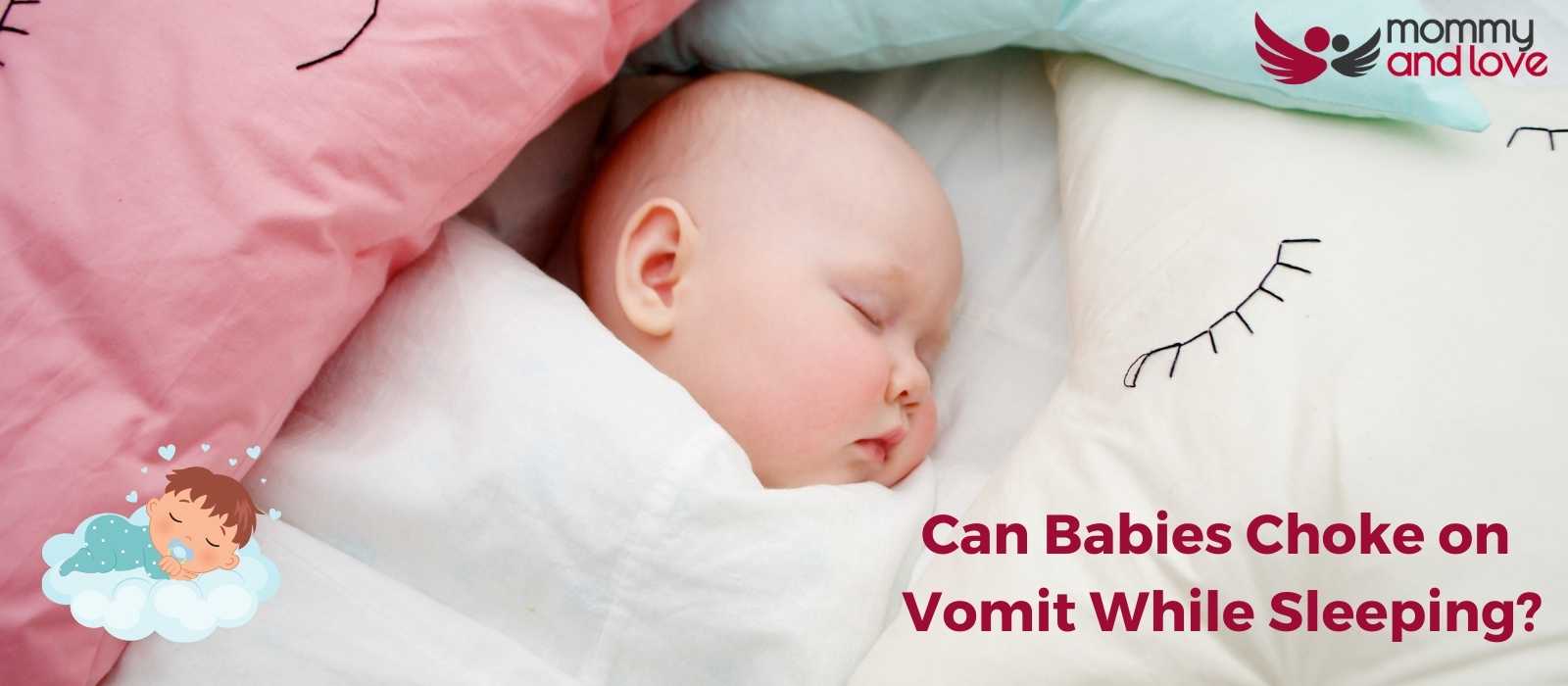One of the most frightening things that can happen to a parent is finding their baby choking on vomit. It’s something that many parents don’t think about, but it’s a real danger for babies. In this blog post, we will discuss what parents need to know about babies and vomit. We will also provide some tips for preventing your baby from choking on vomit while sleeping.
Babies can choke on vomit while sleeping, but there are ways to prevent it. The best way to prevent your baby from choking on vomit is to put them to sleep on their back. If your baby does vomit, it is important to clear the vomit away from their mouth and nose and to ensure that they are in a safe position.
Can Babies Choke on Vomit?

Healthy babies can choke on their own vomit if they are not positioned correctly. If a baby is lying on his or her back and vomiting, there is a risk that the vomit will go down the wrong pipe and cause choking.
Vomiting is a common occurrence in babies, and it can happen for many reasons mostly down to their gag reflex. Most of the time, vomiting is not a cause for concern. Babies automatically cough up or swallow any liquid that they vomit and their gag reflex naturally prevents choking, the reflex is there to keep the airway clear.
While it’s certainly possible for babies to choke on vomit, it’s not necessarily common. And, even if it does happen, it doesn’t necessarily mean that the baby will stop breathing or suffer any serious consequences.
However, there are times when vomiting can be dangerous for babies. One of those times is when babies are sleeping.
What Causes a Child to Throw Up in Their Sleep?
There are many potential causes of vomiting during sleep in children. Some of the most common include:
-Gastroesophageal reflux disease (GERD): This is a condition in which stomach acid flows back up into the esophagus, causing irritation and sometimes vomiting. GERD is more common in infants and young children, but can occur at any age.
-Motion sickness: This is often the cause of vomiting during car or air travel. Children with motion sickness may also vomit during other activities such as roller coaster rides.
-Infections: Viral infections, such as the stomach flu, are a common cause of vomiting in children. Bacterial infections, such as food poisoning, can also cause vomiting.
-Blockage: Another potential cause of vomiting is a blockage in the intestines. This can be caused by things like swallowed objects or constipation.
-Sleep apnea: This is a condition in which breathing is interrupted during sleep. It can cause snoring, gasping, or vomiting.
– Acid reflux: This is a condition in which stomach acid flows back up into the esophagus, causing irritation and sometimes vomiting. Acid reflux is more common in infants and young children, but can occur at any age.
How Do I Stop My Baby From Choking on Vomit at Night?

The best way to reduce the risk of choking is to ensure that your sleeping baby is always sleeping on their back. This position allows any regurgitated milk to flow down and away from the airways.
When a baby is sleeping on the back, the upper respiratory airways are positioned above the oesophagus . This anatomical position protects the airway from aspiration of vomit or other gastric contents. However, when a baby is sleeping on the side or stomach, this protection is lost and there is a greater risk for choking.
Babies are at an increased risk of choking when they are lying on their stomachs. This is because the position of the head and neck can cause regurgitated milk to be pushed up and into the respiratory tract more easily.
If a baby throws up while lying on their back, there is still a small risk of aspiration (inhaling) because of the way the head is positioned. However, this risk is much smaller than when a baby is lying on their stomach or with side sleeping infants.
Sudden infant death syndrome is greatly reduced when babies sleep on their backs.
What to Do if Baby Vomits While Sleeping?
If your baby does vomit while sleeping, it is important to clear the vomit away from their mouth and nose. You can do this by using a soft cloth or suctioning the vomit out with a bulb syringe. It is also important to ensure that your baby is in a safe position after vomiting.
The best position for a baby to sleep in after vomiting is on their back with their head and shoulders elevated. This will help to prevent the vomit from going down into their throat and causing them to choke.
Is It Safe to Lay a Baby Down After Vomiting?

After a child vomits, it is important to clean them off and then monitor them closely. Most of the time, children will be tired and want to sleep after vomiting. It is generally safe to let them sleep, but you should keep an eye on them in case they start vomiting again.
If your child seems to be in pain or is having trouble breathing, call 911. Otherwise, give them some time to rest and let them sleep it off.
If your child vomits more than once in a short period of time, or if they have any other symptoms like a fever, diarrhea, or abdominal pain, you should take them to the doctor to make sure there isn’t a more serious problem going on.
However, if your child just has an occasional bout of vomiting, there’s no need to worry. Just keep an eye on them and make sure they stay hydrated. With a little rest and TLC, they’ll be back to their usual self in no time.
When Should I Be Concerned About My Baby Vomiting?
If your baby is vomiting more than a few times a day, or if the vomit is green or brown, you should be concerned and contact your doctor. If your baby is also having trouble breathing, has a fever, or seems lethargic, you should take them to the emergency room immediately.
Babies can dehydrate quickly, so it is important to keep an eye on their fluid intake and watch for signs of dehydration. If you are concerned about your baby vomiting, contact your doctor or take them to the emergency room.
Will Baby Choke if He/She Vomits While Sleeping on the Back?
Most babies will not choke on vomit while sleeping on their backs. In fact, according to the American Academy of Pediatrics (AAP), “there is evidence that babies who sleep on their backs are less likely to choke than babies who sleep on their stomachs.”
In fact, babies swallow and clear fluids better when lying on their back AAP recommends that all babies be put to sleep on their backs to reduce the risk of Sudden Infant Death Syndrome (SIDS) and most sids deaths occur from babies sleeping on their stomach.
This is probably down to the airway protection that the position gives, as well as reducing the amount of stomach contents that can be brought up.
If your baby does vomit while sleeping on their back, there is no need to worry. They will not choke on their vomit and should be able to clear it from their mouth and nose easily as they can swallow fluid more easily than front lay babies.
The Bottom Line on Babies Choking in Their Sleep
Babies are less likely to choke on vomit while sleeping on their backs than when they are sleeping on their stomachs. If your baby vomits while sleeping, make sure to clear the vomit away from their mouth and nose and put them in a safe position afterwards.
Most of the time, babies will be tired after vomiting and want to sleep. Let them sleep, but keep an eye on them in case they start vomiting again. If your baby has any other symptoms like a fever, diarrhea, or abdominal pain, take them to the doctor to make sure there isn’t a more serious problem going on.
Vomiting is pretty unpleasant for everyone involved. But don’t worry, with a little care and rest, your little one will be back to their usual self in no time. Just make sure to keep an eye on them and contact your doctor if you have any concerns.
Happy parenting!




